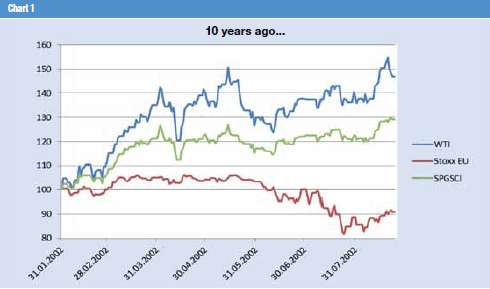The United Nations Conference on Trade and Development this week issued an eye-catching report into the causes of oil price volatility, concluding that commodity markets in general were increasingly driven by broad trends in financial investment, and not by their own unique supply and demand factors.
This debate has been running for a few years, but UNCTAD’s research was remarkable for how clearly it came down on the side of those who argue that the sheer scale of financial investment in commodities has allowed prices in those markets to become divorced from the underlying fundamentals.
As oil has become just another “asset class” it seems to be moving in tandem with equities, the report said, whereas a rational economist might expect supply and demand factors regularly to pull these markets in different directions.
For a telling illustration of how markets have changed in the last ten years, compare two graphs from the UNCTAD report. The first one above tracks the WTI crude price, the S&P Goldman Sachs Commodity Index and the Euro Stoxx 600 index of European equities during the first seven months of 2002. (Platts and Standard & Poor’s are both divisions of The McGraw-Hill Companies.)
With all three prices indexed to 100 at the start of the year, the graph shows them moving in separate directions over the following months, with WTI prices rising considerably, the S&P GSCI rising more modestly and the European stock index ending in negative territory.
There is some correlation between the WTI price and the S&P GSCI (not surprisingly as the crude price is one of the components of the commodity index), but oil and commodities are clearly moving very independently from equities.
Now fast forward ten years to the start of this year, and look at the same indices. The change is obvious: oil and commodities have been moving in near perfect harmony with equities. Why should a crude futures market based on a landlocked US crude supply in Oklahoma track so closely stock markets in Europe, which have been almost obsessively following the twists and turns in the Eurozone crisis?
According to the UNCTAD analysis, commodity markets no longer have their own dynamics. As financial investment in commodities like oil has snowballed in recent years, oil markets in turn respond to the same signals moving other global markets.
For anyone interested in reading more from the report, entitled “Don’t blame the physical markets: Financialization is the root cause of oil and commodity price volatility,” you can find it here.
To subscribe or visit go to: http://www.platts.com

